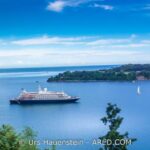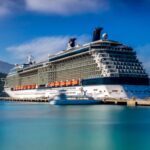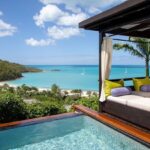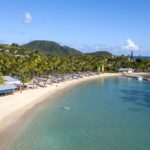Luxury Private Islands represent the pinnacle of exclusive getaways, offering unparalleled privacy and bespoke experiences. These secluded havens, ranging from intimate islets to expansive archipelagos, cater to discerning travelers seeking ultimate tranquility and personalized luxury. From opulent villas and pristine beaches to world-class amenities and breathtaking natural beauty, the allure of private island ownership or a luxurious stay is undeniable.
This exploration delves into the multifaceted world of these exclusive retreats, examining everything from acquisition and ownership to environmental considerations and marketing strategies.
The unique lifestyle associated with private islands extends beyond mere indulgence; it encompasses a commitment to sustainability, responsible development, and preserving the inherent ecological integrity of these unique environments. This guide provides a thorough examination of the multifaceted aspects of luxury private islands, offering valuable insights for prospective buyers, developers, and anyone captivated by the allure of these exceptional destinations.
Defining Luxury Private Islands
Luxury private islands represent the pinnacle of exclusive getaways, offering unparalleled seclusion, personalized service, and breathtaking natural beauty. These havens are more than just landmasses; they are meticulously crafted experiences designed to cater to the most discerning clientele, blending opulence with a deep respect for the surrounding environment.
Defining characteristics extend beyond mere size or location. A true luxury private island offers a seamless integration of exceptional amenities, personalized service, and environmental stewardship. The overall experience is curated to provide an unparalleled sense of privacy, exclusivity, and tranquility.
Amenities on Luxury Private Islands
The amenities found on luxury private islands are as diverse as the islands themselves, but consistently focus on delivering exceptional comfort and personalized service. These typically include lavish accommodations, often featuring multiple villas or residences, each with its own unique character and design.
Beyond accommodation, expect to find state-of-the-art recreational facilities such as private pools, tennis courts, fitness centers, and spas. Many islands also offer a range of water sports equipment, from kayaks and paddleboards to yachts and diving gear. Gourmet dining experiences, often overseen by renowned chefs, are a hallmark of these exclusive retreats. Dedicated staff, including butlers, chefs, and concierge services, ensure that every need is anticipated and met.
Types of Luxury Private Islands
Luxury private islands vary significantly in size, location, and style. Some are expansive, offering ample space for sprawling villas and extensive recreational facilities, while others are more intimate, providing a secluded retreat for a smaller group.
Location plays a crucial role in shaping the overall experience. Islands in the Caribbean, known for their pristine beaches and turquoise waters, offer a tropical paradise. Those in the Mediterranean boast a rich history and cultural heritage. Islands in the South Pacific offer a more remote and secluded escape. Architectural styles also vary widely, ranging from traditional island designs to contemporary modern villas, each reflecting the unique character of its location.
Ecological Considerations in Developing and Maintaining Luxury Private Islands
Developing and maintaining a luxury private island requires a delicate balance between creating a luxurious experience and preserving the natural environment. Sustainable practices are crucial to minimizing the impact on the island’s ecosystem.
This includes responsible waste management, water conservation strategies, and the use of renewable energy sources. Protecting biodiversity is paramount, often involving the creation of protected areas and initiatives to preserve local flora and fauna. Luxury private island developers are increasingly embracing eco-friendly building materials and practices, ensuring that their developments minimize environmental impact and enhance the natural beauty of the island.
Ownership and Acquisition of Luxury Private Islands
Acquiring a private island is a complex undertaking, requiring significant financial resources, legal expertise, and meticulous planning. The process blends elements of real estate transactions with the unique challenges presented by offshore properties and often involves navigating international laws and regulations. Understanding the intricacies of ownership and the associated costs is paramount before embarking on this exclusive venture.
Legal Processes Involved in Purchasing a Private Island
Purchasing a private island involves a multifaceted legal process that often extends beyond the typical real estate transaction. The initial step usually involves identifying a suitable island through specialized brokers or direct contact with government agencies responsible for land management. Due diligence is critical, requiring thorough title searches to verify ownership and ensure no outstanding claims or encumbrances exist.
Legal counsel specializing in international real estate and offshore transactions is essential to navigate the complex legal frameworks governing island ownership, which may vary significantly depending on the island’s location. Contracts must be carefully reviewed and negotiated, encompassing all aspects of the sale, including environmental regulations, access rights, and potential future development limitations. The closing process often requires the involvement of multiple parties, including lawyers, surveyors, and financial institutions.
Post-purchase, ongoing compliance with local laws and regulations related to land ownership and environmental protection is crucial.
Financial Aspects of Owning a Private Island
The financial commitment associated with owning a private island is substantial and encompasses a wide range of expenses. The purchase price itself can vary dramatically depending on the island’s size, location, amenities, and development potential; prices can range from millions to hundreds of millions of dollars. Beyond the initial purchase price, ongoing costs include property taxes, which can be significant, especially in popular jurisdictions.
Maintenance and upkeep are substantial considerations, encompassing everything from landscaping and infrastructure maintenance to potential repairs and renovations. Insurance costs are also a major factor, given the unique risks associated with isolated properties. If developing a resort or other commercial venture on the island, the financial investment becomes even more significant, encompassing construction, staffing, marketing, and operational expenses.
Potential returns on investment can be substantial, particularly for well-managed luxury resorts or exclusive private retreats, but they are not guaranteed and depend heavily on factors such as location, market demand, and effective management. The financial risk is substantial, and careful financial planning and due diligence are essential.
Examples of Successful Private Island Developments
Several successful private island developments serve as case studies for potential investors. The Laucala Island Resort in Fiji, for instance, exemplifies a high-end luxury resort that successfully balances environmental sustainability with opulent accommodations. Necker Island, owned by Richard Branson, showcases the potential for exclusive private retreats that cater to a high-net-worth clientele. These developments demonstrate the possibility of generating significant returns on investment while also showcasing a commitment to sustainable practices and responsible tourism.
However, the success of these projects is a testament to meticulous planning, significant financial resources, and experienced management teams. Each development presents a unique set of challenges and opportunities dependent on location, market dynamics, and environmental factors.
Hypothetical Business Plan for Developing and Managing a Luxury Private Island Resort
A hypothetical business plan for a luxury private island resort would begin with a thorough market analysis, identifying the target demographic and competitive landscape. The plan would detail the proposed resort’s design and amenities, focusing on creating a unique and exclusive experience. A comprehensive financial projection would include start-up costs, operational expenses, revenue projections, and return on investment timelines.
A robust marketing strategy would be crucial for attracting high-net-worth individuals and ensuring strong occupancy rates. Environmental sustainability would be integrated into all aspects of the resort’s operations, aiming for minimal environmental impact. A strong management team with expertise in hospitality, finance, and environmental stewardship would be essential for successful execution. The plan would also address legal and regulatory compliance, including obtaining necessary permits and licenses.
Risk management strategies would be incorporated to mitigate potential challenges, such as natural disasters or economic downturns. Ultimately, the success of such a venture hinges on a well-defined business plan, experienced management, and a commitment to delivering an unparalleled luxury experience.
Lifestyle and Experiences on Luxury Private Islands
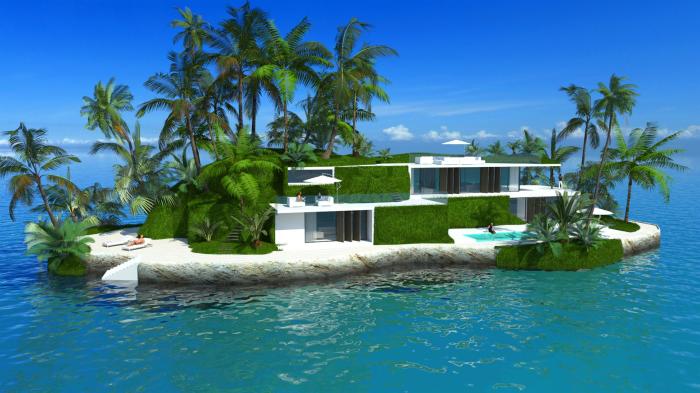
Source: gabriels.net
Owning a luxury private island offers an unparalleled lifestyle, characterized by exceptional privacy, bespoke experiences, and a level of personalized service rarely found elsewhere. Imagine waking to the sound of gentle waves, spending your days exploring pristine beaches and turquoise waters, and enjoying evenings under a star-studded sky, all within your own exclusive domain. This level of seclusion and personalized luxury is transformative, offering a unique escape from the everyday world.The possibilities for crafting a unique and unforgettable lifestyle on a private island are virtually limitless, extending beyond the typical vacation experience.
It becomes a personal sanctuary, a place for rejuvenation, exploration, and the creation of cherished memories.
A Week-Long Luxury Private Island Itinerary
A carefully curated itinerary can maximize the enjoyment of a week-long stay. This sample itinerary balances relaxation with exploration, showcasing the diverse experiences available.
- Day 1: Arrival and Settling In. Private transfer by yacht or seaplane, followed by a welcome reception with personalized cocktails and a tour of the island’s amenities.
- Day 2: Beach Relaxation and Water Sports. Morning spent lounging on pristine beaches, followed by an afternoon of kayaking, paddleboarding, or snorkeling in the crystal-clear waters. A private chef prepares a fresh seafood dinner on the beach at sunset.
- Day 3: Island Exploration and Hiking. Guided hike to discover hidden coves and panoramic viewpoints. Enjoy a picnic lunch amidst breathtaking scenery. Evening spent stargazing from a secluded spot on the island.
- Day 4: Spa Day and Wellness. Indulge in a rejuvenating spa treatment at a private villa spa, followed by yoga or meditation sessions overlooking the ocean. Enjoy a healthy and delicious organic meal prepared by the private chef.
- Day 5: Fishing and Diving Excursion. A private fishing charter, followed by an afternoon of scuba diving or snorkeling to explore the vibrant coral reefs. A celebratory dinner featuring the day’s catch is prepared by the chef.
- Day 6: Cultural Immersion and Local Exploration. A private boat trip to a nearby island or village for cultural immersion, interacting with locals and learning about their traditions. A farewell dinner featuring local cuisine is enjoyed at a private beachfront setting.
- Day 7: Departure. Enjoy a final breakfast overlooking the ocean before a private transfer back to the mainland, filled with cherished memories of your private island escape.
Activities and Experiences Available on Private Islands
The range of activities available on a private island is vast and caters to a wide array of interests. From adrenaline-pumping adventures to serene moments of relaxation, there is something for everyone.
- Water sports: Swimming, snorkeling, diving, kayaking, paddleboarding, windsurfing, kitesurfing, jet skiing.
- Land-based activities: Hiking, biking, exploring hidden coves, bird watching, nature walks.
- Wellness and relaxation: Yoga, meditation, spa treatments, private fitness sessions.
- Culinary experiences: Private chef services, gourmet meals, cooking classes, wine tasting.
- Entertainment: Movie nights under the stars, private concerts, themed parties.
Personalized Service and Bespoke Experiences
The hallmark of a luxury private island experience is the level of personalized service provided. Guests can expect highly attentive staff who anticipate their every need, creating a seamless and effortless experience. Bespoke experiences are easily arranged, tailoring the itinerary to individual preferences and interests. This might include arranging private yacht charters, organizing exclusive excursions, or even commissioning a custom-designed artwork for the villa.
For example, a guest passionate about marine biology could arrange a private session with a marine biologist to explore the island’s coral reefs in detail, or a family could arrange for a private children’s entertainer to keep the little ones amused.
Privacy and Seclusion on Private Islands
The ultimate luxury offered by private island ownership is the unparalleled privacy and seclusion. Unlike resorts or hotels, private islands offer complete control over one’s environment, ensuring a truly tranquil and undisturbed escape. The ability to disconnect from the outside world and immerse oneself in the beauty of nature is a priceless benefit. This level of privacy extends to all aspects of the stay, from choosing when and how to interact with staff to enjoying the freedom to roam the island at one’s own pace, free from the crowds and noise often associated with other vacation destinations.
This allows for genuine relaxation and the opportunity to reconnect with oneself and loved ones in a truly unique and undisturbed setting.
Environmental Impact and Sustainability
The development of luxury private islands presents a unique set of environmental challenges. Balancing the desire for opulent amenities with the preservation of fragile island ecosystems requires careful planning and a commitment to sustainable practices. Failure to do so can lead to significant and irreversible damage to the natural environment, impacting biodiversity, water resources, and the overall health of the island ecosystem.The potential environmental concerns associated with private island development are multifaceted and interconnected.
Construction activities can lead to habitat destruction, soil erosion, and water pollution from runoff containing sediment, chemicals, and debris. Increased human presence can disrupt delicate wildlife populations, potentially leading to species displacement or even extinction. Furthermore, the demand for fresh water and energy can strain limited island resources, particularly in arid or remote locations. Improper waste management can also contribute to pollution of land and sea, further jeopardizing the island’s ecological integrity.
Sustainable Practices for Minimizing Ecological Footprint
Minimizing the environmental impact of private island development necessitates a proactive and holistic approach. This involves employing sustainable building materials, implementing efficient energy and water management systems, and adopting responsible waste management strategies. Prioritizing the use of locally sourced materials reduces transportation emissions and supports the local economy. Renewable energy sources, such as solar and wind power, can significantly reduce reliance on fossil fuels.
Water conservation measures, including rainwater harvesting and greywater recycling, are crucial in water-scarce environments. Comprehensive waste management plans, encompassing recycling, composting, and proper disposal of hazardous waste, are essential to prevent pollution. Furthermore, careful landscaping and habitat restoration efforts can help mitigate the impact of construction and enhance the island’s biodiversity. Examples include using native plant species in landscaping to support local wildlife and restoring degraded coastal habitats to protect against erosion.
The Four Seasons Landaa Giraavaru in the Maldives, for example, uses solar energy and has implemented extensive coral reef regeneration programs.
Comparison of Eco-Friendly Development Approaches
Different approaches to eco-friendly development exist, each with its own strengths and weaknesses. One approach focuses on minimizing human intervention, prioritizing the preservation of the existing ecosystem and limiting development to only essential structures. This approach, often favored in ecologically sensitive areas, may restrict the scale and scope of development but ensures maximum environmental protection. A contrasting approach emphasizes sustainable design and technology, integrating eco-friendly practices into all aspects of development.
This approach allows for more extensive development while striving to minimize the environmental impact through innovative solutions. For instance, utilizing green building techniques, such as passive solar design and natural ventilation, can significantly reduce energy consumption. A third approach combines elements of both, striking a balance between development and conservation by carefully selecting development locations and employing sustainable practices throughout the project.
The choice of approach depends on the specific characteristics of the island, the owner’s vision, and the level of environmental protection desired.
Environmental Monitoring and Preservation Plan
A comprehensive environmental monitoring and preservation plan is essential for the long-term sustainability of a private island. This plan should include regular assessments of water quality, air quality, soil health, and biodiversity. Baseline data should be collected before any development begins to provide a benchmark against which future changes can be measured. Ongoing monitoring should track key environmental indicators, allowing for early detection of any negative impacts and timely intervention.
The plan should also Artikel specific strategies for habitat restoration, waste management, and pollution control. Regular audits and reporting should ensure accountability and transparency. Moreover, collaboration with local communities and environmental organizations can provide valuable expertise and ensure the plan aligns with broader conservation goals. This collaborative approach is crucial for successful long-term environmental stewardship and helps ensure the island’s ecological integrity for generations to come.
For example, regular biodiversity surveys could track the populations of key species, identifying any trends that might indicate the need for conservation measures.
Marketing and Branding of Luxury Private Islands
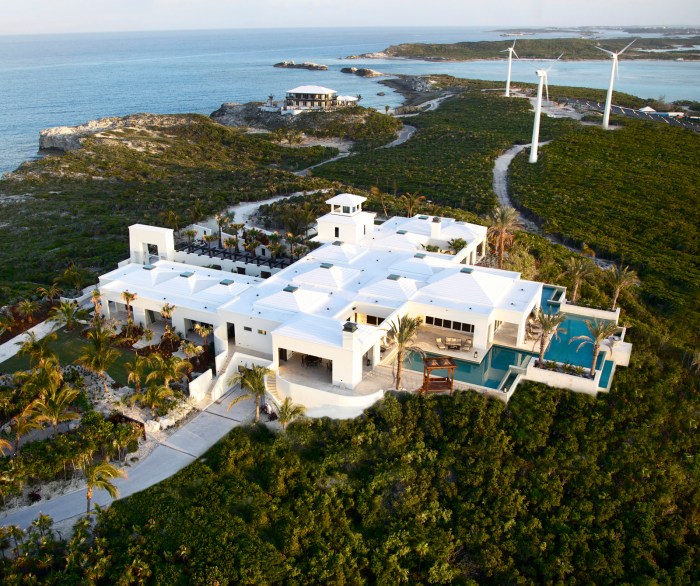
Source: privateislandnews.com
Marketing and branding a luxury private island requires a sophisticated approach that highlights exclusivity, unparalleled experiences, and a commitment to preserving the natural beauty of the location. The target audience is discerning, affluent individuals seeking ultimate privacy and unique lifestyle opportunities. The marketing strategy must effectively communicate the island’s unique selling propositions and resonate with this highly specific demographic.
Luxury Private Island Brochure Design
A luxury private island brochure should be a tactile experience, reflecting the quality and exclusivity of the offering. Imagine a brochure printed on thick, high-quality paper stock, perhaps with a subtle texture reminiscent of sand or seashells. The imagery would showcase breathtaking aerial shots of the island, highlighting pristine beaches, lush vegetation, and crystal-clear waters. Interior spreads would feature detailed architectural renderings of villas or residences, showcasing luxurious amenities like private pools, expansive decks, and state-of-the-art technology.
Text should be minimal, elegant, and evocative, focusing on key features and benefits rather than overwhelming the reader with details. The brochure’s overall design should convey a sense of tranquility and sophistication, mirroring the experience awaiting potential buyers.
Website Copy for a Luxury Private Island, Luxury Private Islands
The website copy should be as meticulously crafted as the brochure. High-resolution photography and videography are essential, showcasing the island’s beauty from various perspectives. The website’s navigation should be intuitive and elegant, guiding visitors seamlessly through information about property details, amenities, lifestyle offerings, and investment opportunities. The language should be sophisticated yet approachable, emphasizing the exclusivity and privacy of the island while subtly hinting at the unparalleled experiences it offers.
Testimonials from satisfied owners or high-profile guests could further enhance credibility and desirability. The call to action should be clear and compelling, encouraging potential buyers to contact the sales team for a private viewing or further information.
Brand Identity and Messaging Strategy for a Private Island Resort
Developing a brand identity for a private island resort necessitates a clear understanding of the target audience and the island’s unique attributes. The brand name should be memorable, evocative, and reflective of the island’s character. A carefully chosen logo, incorporating elements of nature and luxury, would complement the brand name. The brand messaging should focus on the emotional benefits of owning or visiting the island, such as tranquility, rejuvenation, and escape from the everyday.
The brand voice should be sophisticated and refined, yet approachable and welcoming. Consistency in visual identity and messaging across all marketing materials is crucial to building a strong and recognizable brand. An example of a successful brand might focus on “unparalleled seclusion and bespoke experiences,” contrasting sharply with mass-market resorts.
Comparison of Marketing Strategies of Different Luxury Private Island Destinations
Different luxury private island destinations employ varied marketing strategies tailored to their unique offerings and target audiences. Some may emphasize exclusivity and privacy, targeting high-net-worth individuals through private events and bespoke marketing materials. Others may highlight adventure and wellness, attracting a younger, more active demographic through social media campaigns and influencer partnerships. Some islands may focus on sustainability and conservation, appealing to environmentally conscious buyers.
The choice of marketing channels, messaging, and overall brand identity varies depending on the island’s unique selling proposition and desired clientele. For example, a remote, untouched island might focus on showcasing its pristine natural beauty and sense of seclusion, while a developed island with extensive amenities might emphasize its luxurious facilities and convenient access.
Social Media and Digital Marketing for Promoting a Private Island
Social media and digital marketing play a vital role in promoting luxury private islands. High-quality photography and videography are essential for showcasing the island’s beauty and attracting potential buyers. Targeted advertising on platforms like Instagram and Facebook can reach affluent individuals interested in luxury travel and real estate. Influencer marketing, partnering with travel bloggers and lifestyle influencers, can generate buzz and reach a wider audience.
Virtual tours and 360° imagery can allow potential buyers to experience the island remotely, while a well-maintained website provides detailed information and facilitates inquiries. The use of social media should maintain a consistent brand voice and visual identity, mirroring the sophisticated and exclusive nature of the island itself.
Illustrative Examples of Luxury Private Islands
Luxury private islands represent the pinnacle of exclusive getaways, offering unparalleled privacy, bespoke experiences, and breathtaking natural beauty. These havens cater to discerning individuals seeking an escape from the ordinary, providing a sanctuary where personalized service and lavish amenities are paramount. The following examples showcase the diversity and allure of this unique asset class.
Luxury Private Island Examples: A Comparative Overview
The following table provides a concise comparison of three distinct luxury private islands, highlighting their unique features and amenities. These islands represent a spectrum of styles and experiences, showcasing the breadth of options available within the luxury private island market.
| Island Name | Location | Unique Features | Notable Amenities |
|---|---|---|---|
| Laucala Island | Fiji | Vast, sprawling landscape with diverse terrain, including mountains, rainforests, and pristine beaches. Features a distinct Fijian architectural style blended with modern luxury. Known for its commitment to sustainability and environmental preservation. | Private villas with personal butlers, world-class dining experiences, championship golf course, equestrian center, private beach, extensive water sports facilities, and a luxurious spa. |
| North Island | Seychelles | Secluded location with untouched natural beauty, characterized by pristine beaches, granite boulders, and lush vegetation. Features minimalist, eco-friendly architecture that blends seamlessly with the environment. | Eleven luxurious villas, each with private pools and plunge pools, dedicated villa hosts, fine dining options, private beach access, a variety of water sports activities, and personalized wellness programs. |
| Musha Cay | Bahamas | Seven private islands, offering unparalleled privacy and seclusion. Features a blend of colonial and modern architecture, with a focus on comfortable elegance. | Multiple luxurious villas, private yacht, dedicated staff, world-class dining, extensive water sports equipment, fishing excursions, and personalized experiences tailored to guest preferences. |
Unique Experiences Offered by Luxury Private Islands
The true value of a luxury private island lies not just in its physical attributes but in the curated experiences it offers. These experiences are meticulously designed to cater to individual preferences, providing memories that last a lifetime.
The following points illustrate the diverse range of bespoke experiences available on select luxury private islands:
- Laucala Island: Guests can engage in a range of activities, from horseback riding through the island’s lush landscapes to exploring vibrant coral reefs through snorkeling or diving. The island’s private golf course offers a unique golfing experience, while the award-winning spa provides rejuvenating treatments using locally sourced ingredients.
- North Island: The focus here is on intimate connection with nature. Guests can explore hidden coves by kayak, relax on pristine beaches, or embark on guided nature walks to discover the island’s unique flora and fauna. Personalized wellness programs and private yoga sessions contribute to a holistic experience of relaxation and rejuvenation.
- Musha Cay: The unique experience offered by Musha Cay centers around complete personalization. Guests can design their itinerary, choosing from a wide range of activities, including private fishing excursions, exploring nearby islands by yacht, or enjoying gourmet dining experiences prepared by a world-class chef. The emphasis is on creating a bespoke adventure tailored to each guest’s preferences.
Ultimate Conclusion
Ultimately, the appeal of luxury private islands rests on the harmonious blend of unparalleled luxury, pristine natural beauty, and the promise of an unforgettable escape. Whether considering acquisition, development, or simply dreaming of a secluded retreat, understanding the complexities of ownership, environmental responsibility, and effective marketing is paramount. This comprehensive overview aims to illuminate the path towards realizing the dream of owning or experiencing the unique allure of a luxury private island, emphasizing both the remarkable opportunities and the crucial considerations involved.
Essential Questionnaire
What is the average cost of a luxury private island?
The price varies drastically based on size, location, amenities, and existing infrastructure. Prices can range from millions to hundreds of millions of dollars.
What legal considerations are involved in buying a private island?
Legal processes involve thorough due diligence, international laws (if applicable), environmental impact assessments, and securing necessary permits and licenses. Engaging legal and real estate professionals experienced in international transactions is crucial.
What are the ongoing maintenance costs of a private island?
Ongoing costs include property taxes, staff salaries (if applicable), infrastructure upkeep, security, and environmental management. These expenses can be substantial.
How can I find a luxury private island for sale?
Specialized real estate agencies specializing in high-end properties and private islands are the best resource. Online listings may also be available, but professional guidance is strongly recommended.
